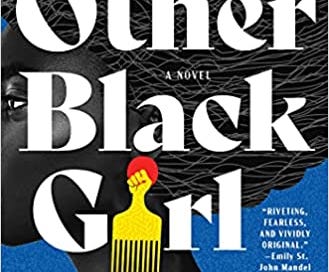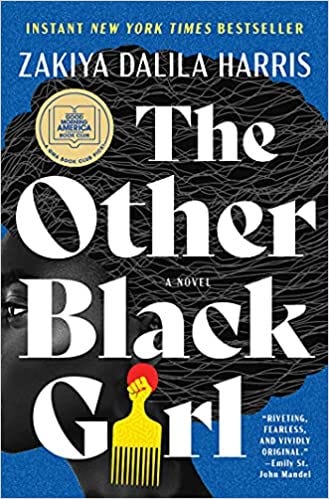The Other Black Girl by Zakiya Dalila Harris
The Other Black Girl
Author: Zakiya Dalila Harris
Genre: Contemporary Fiction / Literary Fiction
Date: 10 September 2021
Rating: 3.5 stars
Review: The last couple of years have made readers everywhere extremely aware of the books they choose to read, not only in terms of content but also with regards to the authors and the people who make the decisions about what gets published. Who decides which authors deserve a platform to share their stories? Who decides which stories deserve marketing to boost their readership? And most importantly, whose stories are being silenced because of an imbalanced structure of power? Whether it is the fact that we as Indians don’t read, or sometimes don’t even know about books written by Indian authors and automatically reach out for popular American or British titles, or the lack of diverse voices in the publishing industry, now more than ever readers have to make a conscious decision to look at our reading lists and judge them before falling into the trap of Bestseller lists. Publishing houses are predominantly white spaces. In India, the number of Dalits in publishing or newsrooms is sadly low. Gatekeeping is, therefore, clearly a big part of these industries.
The Other Black Girl by ZDH is an exploration of this predominance of white voices in the publishing industry, but also most workforces, and the barriers that stand in the way of anyone else making a spot for themselves at the top. It follows ambitious and yet insecure Nella who works really hard as an assistant to an editor at a big publishing house, Wagner. She is the only Black girl in her office and this comes with its unique challenges. The author dives deep into the concept of micro-aggressions and the need that POC feel to work double to achieve the same things that their white counterparts get handed easily. When the newest assistant starts working at the office, Nella is glad to have another Black person around her. She hopes for solidarity and someone who will fight to change the atmosphere at their workplace together. But soon Nella realises that there is more to Hazel than the charming and cheerful personality she puts on and she finds herself in a web of mysteries that date back to the 80s.
This book was pitched as The Devil Wears Prada meets Get Out and while yes, it does tick both those boxes it is also very different. Anyone going in expecting a Miranda Priestly-esque story will find elements in common in the portrayal of an incredibly competitive workplace that forces Nella to put in extensive hours of her time even outside of work hours into reading manuscripts and doing odd jobs for her demanding boss but the similarities end there. The Other Black Girl deals with the politics of race and diversity hires in a workplace. It talks about the competition between POC to be the last one standing in a company. Amidst all of these, there is a sci-fi plot that brings in a surreal twist to the entire story.
First, let me get the things that I loved out there. I enjoyed Malaika and Nella’s friendship. I wish we could have seen more of them because friendships like these are rarely portrayed as the central focus of any story. The book subverts the stereotypical portrayals of black girls as loud and boisterous and I thought that most of the characters were well-written, if not always likeable. The discussions about black hair were interesting and made me want to look for recommendations on other books about the topic. I have realised that not a lot of people like the surrealist elements of the story but I thought it introduced an interesting angle to start conversations about the fine line that Black women have to walk in order to make it good at their jobs while still being true to their identities. It also added an intriguing thriller aspect to the novel that came as a welcome surprise. Overall, I thought the idea was great.
However, the execution was a little lacklustre. The book could have been edited a little more. There were pages in the book when I felt like nothing of substance happened and could have easily been left out because they didn’t take the story forward and neither did they add to character development. Chapters from the Points of View of other characters were interspersed in the book and while they did help to add context and build the world that ZDH was creating, it became a little difficult to keep track of who we were following at any given time. So much so, that I did not realise who was talking in the last chapter till the very end. Ambiguous ends are not my cup of tea but this open-ended climax kind of worked for me. Except for the fact that there were far too many loose ends. I would have liked to see Malaika and Owen in the end, even if for the sole reason that they were characters whose interactions I was most interested in.
This is a book predominantly about the experience of Black women so my review can be only about the story itself and I cannot comment as to the authenticity of the experience narrated in it. I, therefore, actively went out to find other Black reviewers who have talked about this book and I recommend everyone else to do the same. Leaving these details aside, the book was a fun read that kept me engaged, especially in the last 50 pages or so because that was when most of the action took place.
Also repeating what I said the last time, there is something very interesting about a book that talks about the experiences of authors, readers and anyone who engages with literature. It makes for an interesting read because not only are you engaging with your opinions about the book that you are reading but also the opinions and thoughts of other readers. The difference between The Paris Library and this book was that while the former explored the thoughts of solely a reader, this one delves into the considerations that go into deciding whether a book will be published and then the details that have to be ironed out before the process finally begins. With the example of Needles and Pins, the fictional book in this book that in more ways than one is the inciting incident in the plot, ZDH talks about the way the publishing industry reacts to diversity. I especially liked the discussion on what it means to call an author racist or a book diverse. Does a book deserve to be called diverse if the POC in the book is just another stereotypical depiction that has been fed to us over years?
One of the reasons why I enjoyed reading this book despite the few problems I had with the writing style was how much of the publishing industry I learned about. And even though saying that this novel highlighted the problems in the industry would be an understatement, but I still would love to one day work in the industry that ultimately decides the stories that are told and the stories that are read.



